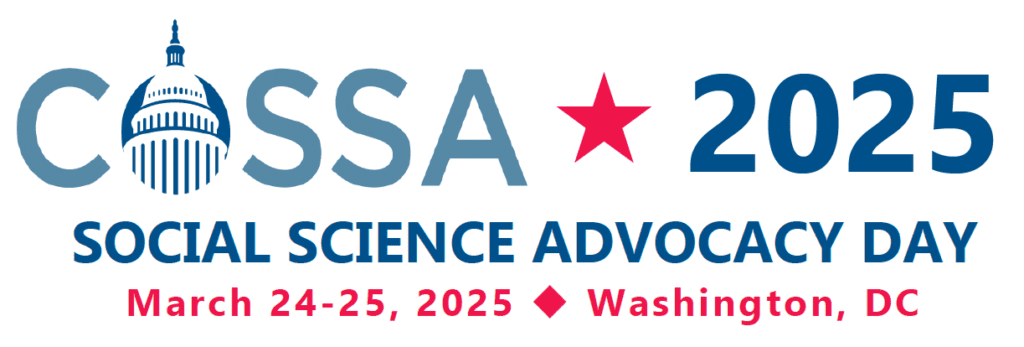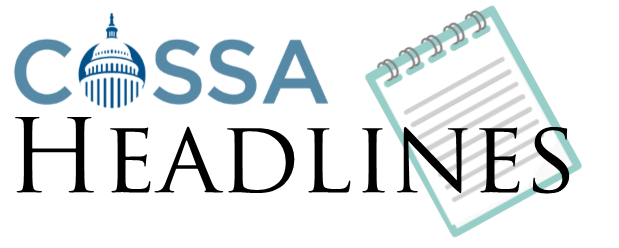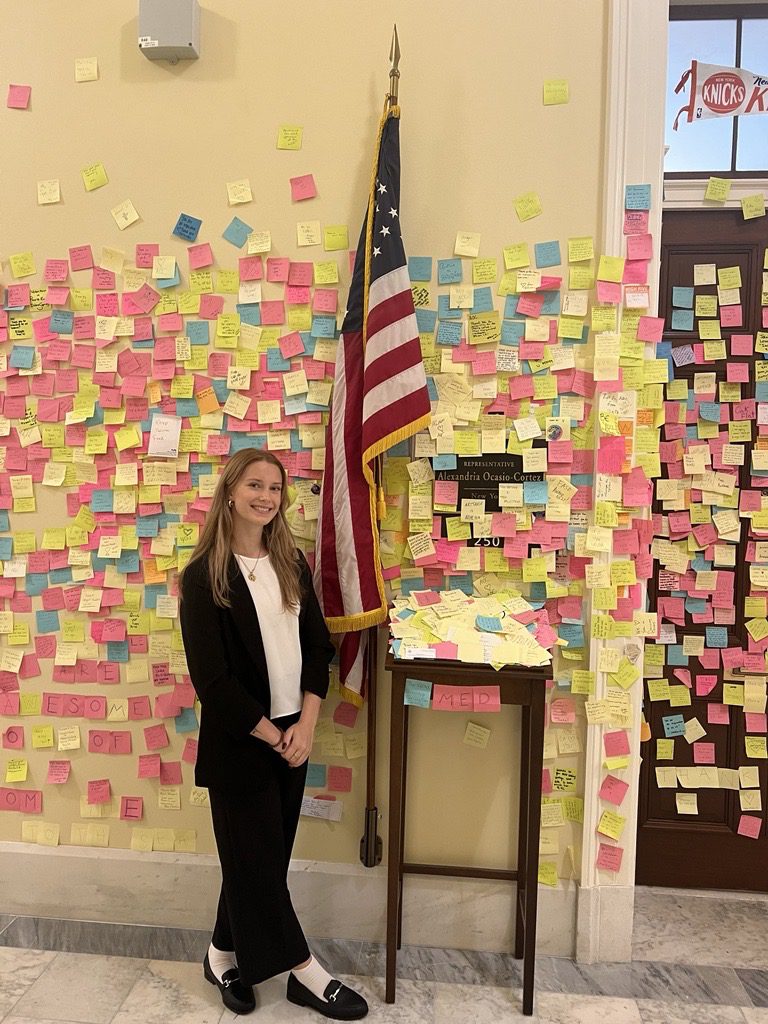Issue 24 (December 10)
A Word from COSSA
Dear Friends:
This is the last COSSA Washington Update of 2024, but it certainly is not the end of our work for the year. As I write, our team is busily preparing for what everyone expects will be a challenging year ahead for policymaking. We are headed into uncertain terrain with the return of the Trump Administration come January 20 and a new Congress with margins tighter than we have seen in a long time.
Last week, COSSA hosted a webinar for our members previewing some of the expected actions of the next Congress and Administration and outlining many of the unknowns that remain. You can watch the recording here.
With federal research funding likely on the chopping block next year, it will be absolutely essential that our community shows up. To that end, I am pleased to announce that early bird registration has opened for COSSA’s 2025 Social Science Advocacy Day on March 24-25, 2025. I hope you will consider joining us in Washington this spring as we work to convince policymakers of the value of our sciences. More details are below.
Finally, as we close out the year, I want to thank all our members for their support. COSSA’s remit is to advocate on behalf of the entire social and behavioral science community. The generosity of our member organizations, through their participation in COSSA’s efforts and annual dues, is what makes this possible. If you do not see your organization on COSSA’s membership list but would like to know more about membership and how you can engage more in 2025, please be in touch.
The challenges that lie ahead will require the participation of our entire community. I hope you will join us.
With warmest wishes this holiday season,
Wendy Naus
COSSA Executive Director
Social Science Advocacy Day 2025 Registration is Open!

Early bird registration for COSSA’s annual Social Science Advocacy Day is officially OPEN! The event will be taking place March 24-25, 2025 in Washington, DC. Take advantage of early bird pricing and register here.
The stakes for research funding have never been higher as we enter a particularly challenging political and budgetary environment. Social Science Advocacy Day is a must for all stakeholders who care about the fate of federal funding for social and behavioral science research and who believe this research should be used to inform sound public policy.
Advocacy Day is open to anyone affiliated with a COSSA member organization or university. Not a member? Learn how to join here.
If your organization is interested in becoming a sponsor for Social Science Advocacy Day, find all of our sponsorship opportunities available here.
Visit the COSSA website for the latest information on Social Science Advocacy Day.
REGISTER NOW: Headlines Webinars continue December 17

It’s the final Headlines of the year! Last Spring, the White House released a seminal report detailing the important contributions the social and behavioral sciences make to addressing some of the nation’s most pressing challenges and promoting better use of social and behavioral science research in evidence-based policymaking across the federal government. The White House Office of Science and Technology Policy (OSTP) released the Blueprint for the Use of Social and Behavioral Science to Advance Evidence-Based Policymaking in May following two years of work by social and behavioral science experts from across federal agencies and departments.
Join COSSA on December 17 for a discussion with Kei Koizumi, OSTP Principal Deputy Director for Science, Society, and Policy, to discuss the report and ways the social and behavioral science research community can further promote the work with lawmakers. RSVP here.
Headlines is a webinar series available to COSSA member organizations. Watch for additional webinar announcements, and previous webinar recordings, on the COSSA website.
Meet COSSA’s Fall Policy Intern: Paige Kirkham!
Paige Kirkham started as COSSA’s fall policy intern in September. Before heading back to class later this month, she provided some reflections from her time at COSSA.
How did you learn about COSSA and the opportunity to serve as a policy intern for the fall?
I am a student at University of Wisconsin-Madison, and was given the opportunity to come to Washington, DC through a program called “Wisconsin in Washington” in which the university brings a group of about twenty student-interns to DC for a semester. The coordinators of this program provide us with a list of opportunities to apply for when searching for internships, one of them being COSSA, which stood out to me as an opportunity and ultimately led me to apply.

How did the internship fit into your academic or career planning?
I am a current senior at UW-Madison studying psychology, criminal justice, and political science, and have been exploring the possibility of careers in politics or the potential to go to law school. Coming to DC in a cohort of predominately political science students, it can be hard to find a niche where I can utilize my psychology major, which is something I am passionate about. COSSA was the perfect opportunity to combine my psychology background and passion with my career goals of working in policy to make changes in this area I am so passionate about. Doing this the semester before graduation has been very illuminating and has influenced me to apply to law schools this cycle.
What stood out to you most about your internship?
I learned so much during my time at COSSA, but one stand out was the deep knowledge I gained of the legislative process and the importance of federal agencies’ role in social science. I enjoyed going to hearings on the NIH, gathering news on these topics that are so important to COSSA, and being given the opportunity to write up articles for the newsletter. Another important part of my time at COSSA was the 2024 election cycle. I was responsible for tracking congressional elections and writing a post-election analysis. I thoroughly enjoyed these tasks as it was a way to keep me closely engaged with those congressional races that matter not only to me personally, but to COSSA as well. Lastly, I enjoyed all the team meetings with Wendy, Kenzie, and Elyse. COSSA is a team of smart, driven women that I had the honor of learning from this semester which is an opportunity I am so grateful for.
What would you tell future policy interns about the opportunity and/or about interning in-person in Washington, DC?
I would tell any policy interns considering the opportunity of interning in DC to absolutely do it. While my time in DC was relatively short, this is the single semester of my collegiate career I consider myself to have learned the most academically and grown the most personally. DC is an amazing city, full of people that are passionate change-makers, and it is unlike any city anywhere else in the world. If given this opportunity, it will certainly teach you much about government, grow your professional network, and enrich your educational experience in a way that could not be done elsewhere. This experience has put me on a professional trajectory that I feel confident in and am excited to explore.
What’s next for you?
This Spring, I begin my final semester at UW-Madison and will be graduating in May. I am currently in the midst of applying for law school and am hoping to attend next Fall where I will focus on law and the government, and hopefully continue to build my knowledge of how I can advance the social sciences through the legal field.
House Oversight Hosts Census Bureau Director Rob Santos
On December 5, the House Oversight Committee held a hearing on the Oversight of the U.S. Census Bureau with Director Rob Santos as the witness. During his opening remarks, House Oversight Chair James Comer (R-KY) raised concerns over the 2020 Census and the overcount and undercount of different states, suggesting that undercounting was found in predominately Republican states while overcounting was found in predominately Democratic states. In his response, Santos indicated that the unexpected impacts of the COVID-19 pandemic exacerbated overcounts and undercounts. Further, he clarified that the Census Bureau and subsequent surveys are non-partisan. Ranking Member Jamie Raskin (R-MD) pointed to a mistrust in government processes in some states as another potential exacerbation of undercounting during the 2020 Census and emphasized the need to have trusted community leaders working alongside the Census Bureau to ensure an accurate count. To this end, Representative Summer Lee (D-PA) spoke to the importance of the Decennial Census, underscoring the vitality of the bureau’s engagement with underserved communities.
Further, Chairman Comer requested clarification on the decision not to include the question of U.S. citizenship in the Decennial Census (see previous COSSA coverage). Attention turned to the American Census Survey (ACS), which does include a question of U.S. citizenship, among other questions that were once included in the Census (see previous COSSA coverage). As indicated by Santos, implementing a citizenship question in the Decennial Census was found to reduce response rates while inclusion of the same question in the ACS did not. While some Republican members, including Representative Jim Jordan (R-OH), argued that the data collected by the ACS was not relevant to the government, Santos indicated the importance of both surveys to foster a broader understanding of the U.S. population.
With modernization at the forefront of the conversation, Santos discussed the ways the Census is expanding online-participation with the Decennial Census as well as implementing a community network to be the “trusted messengers” of the Census Bureau to individual communities to encourage participation. Some House Republicans, including Representative William Timmons (R-SC), indicated that it would become a priority for the following session to conduct oversight on the Census Bureau and draft legislation to include a citizenship question on the Decennial Census.
A full recording of the hearing can be found here.
President-Elect Trump Nominates Dr. Jay Bhattacharya to Lead NIH
President-elect Donald Trump has nominated Dr. Jay Bhattacharya, a professor of health policy at Stanford University, as the Director of the National Institutes of Health (NIH). Notably, Bhattacharya was a critic of the government’s handling of the COVID-19 pandemic and was the plaintiff in the Supreme Court case, Murthy v. Missouri, where he argued that he was “unfairly censored” on social media by the government for his views on the issue. While the case gained national attention, it was ultimately unsuccessful in a 6-3 ruling.
About the nomination, Trump said, “Dr. Bhattacharya will work in cooperation with Robert F. Kennedy Jr. to direct the Nation’s Medical Research, and to make important discoveries that will improve Health, and save lives.”
If confirmed by the Senate, Bhattacharya would inherit the position from Dr. Monica Bertagnolli who was appointed by President Biden and confirmed by the Senate in November 2023 (see previous COSSA coverage).
Stay tuned to COSSA’s continued coverage of the confirmation process.
Trump Names David Sacks as AI Czar/PCAST Head
On December 4, President-elect Trump announced his plan to appoint tech venture capitalist and PayPal cofounder David Sacks to a new “AI czar” position and advisor on cryptocurrency in the next Administration. The announcement also states that Sacks will lead the President’s Council of Advisors on Science and Technology (PCAST).
While little more detail is known about Trump’s plan for PCAST, the naming of Sacks as chair signals that the council will be maintained in Trump’s second term. This is notable particularly because during Trump’s first term, PCAST was not reconstituted until almost three years into his term.
This is a developing story.
OSTP’s CoSTEM Releases Five-Year Federal Strategic Plan Advancing STEM Education and Cultivating STEM Talent
The White House Office of Science and Technology Policy’s (OSTP) National Science and Technology Council’s (NSTC) Committee on Science, Technology, Engineering, and Mathematics (CoSTEM) has released the Federal Strategic Plan Advancing STEM Education and Cultivating STEM Talent. The five-year plan is intended to promote STEM education and careers, particularly in coordination with multi-sector collaborators throughout the STEM ecosystem and has identified three principles to achieve this goal, including expanding opportunity, developing partnerships and the ecosystem, and fostering transparency and accountability. Within these principles, OSTP has identified five pillars including STEM engagement; STEM teaching and learning; STEM workforce; STEM research and innovation capacity; and STEM environments.
The report was released following community listening sessions held by OSTP in March 2023 (see previous COSSA coverage) and is the second iteration of the report, which was first published in May 2013 under the Obama Administration and continued under the Trump Administration (see previous COSSA coverage). The Strategic Plan is a five-year plan that seeks to improve STEM education and the workforce and is required by the America COMPETES Re-authorization Act of 2010. The full report can be found here.
NSF Releases NAIRR Dear Colleague Letter for AI Research and Education
On November 15, the National Science Foundation’s (NSF) National Artificial Intelligence Research Resource (NAIRR) Pilot released a Dear Colleague letter seeking datasets to “enable a broader set of researchers and educations” in artificial intelligence (AI) and foster the development of AI skills in educational environments (see previous COSSA coverage here). The deadline to submit datasets is February 7 and can be submitted here.
Full details about the submission criteria and evaluation can be found here.
Currently Reading: CPI’s Census Accuracy Guides
The Center on Poverty and Inequality (CPI) at Georgetown Law released a series of guides designed for civil rights organizations, advocates, and policymakers. The Census Accuracy series includes:
- Key Concepts Explained, covers essential concepts, such as net and gross accuracy and differential undercounts.
- Key Methods Explained, describes the Bureau’s main evaluation methods: Demographic Analysis and the Post-Enumeration Survey.
- Five Key Results & Trends Explained, summarizes accuracy trends from the 2020 Census and previous counts.
This series is intended to help stakeholders and organizations advocate for necessary research and reforms to ensure every community is accurately counted, promote robust funding for the census by emphasizing the need for accurate data to help ensure fair political representation and equitable resource distribution, and implement measures to mitigate the impact of census inaccuracies.
Social Science Advocacy Day 2025 News
COSSA’s annual Social Science Advocacy Day will be taking place March 24-25, 2025 in Washington, DC! This signature, members-only event brings together social and behavioral science researchers, faculty, students, association professionals, and other advocates from across the country to meet with their elected officials in Congress to discuss the value of our sciences and the importance of federal funding.
Early bird registration is officially OPEN! Register now and take advantage of our early bird rates (these won’t last long).
Visit the COSSA website for the latest information on Social Science Advocacy Day and share with your colleagues.
Editor’s Note: Update Returning on January 7
This is our final issue of the COSSA Washington Update for 2024. Late-breaking news and analysis will be shared with members subscribed to our members-only emails. We will resume our ongoing coverage of policy developments affecting the social and behavioral sciences on January 7.
The COSSA team wishes all our readers a happy and healthy holiday season.

